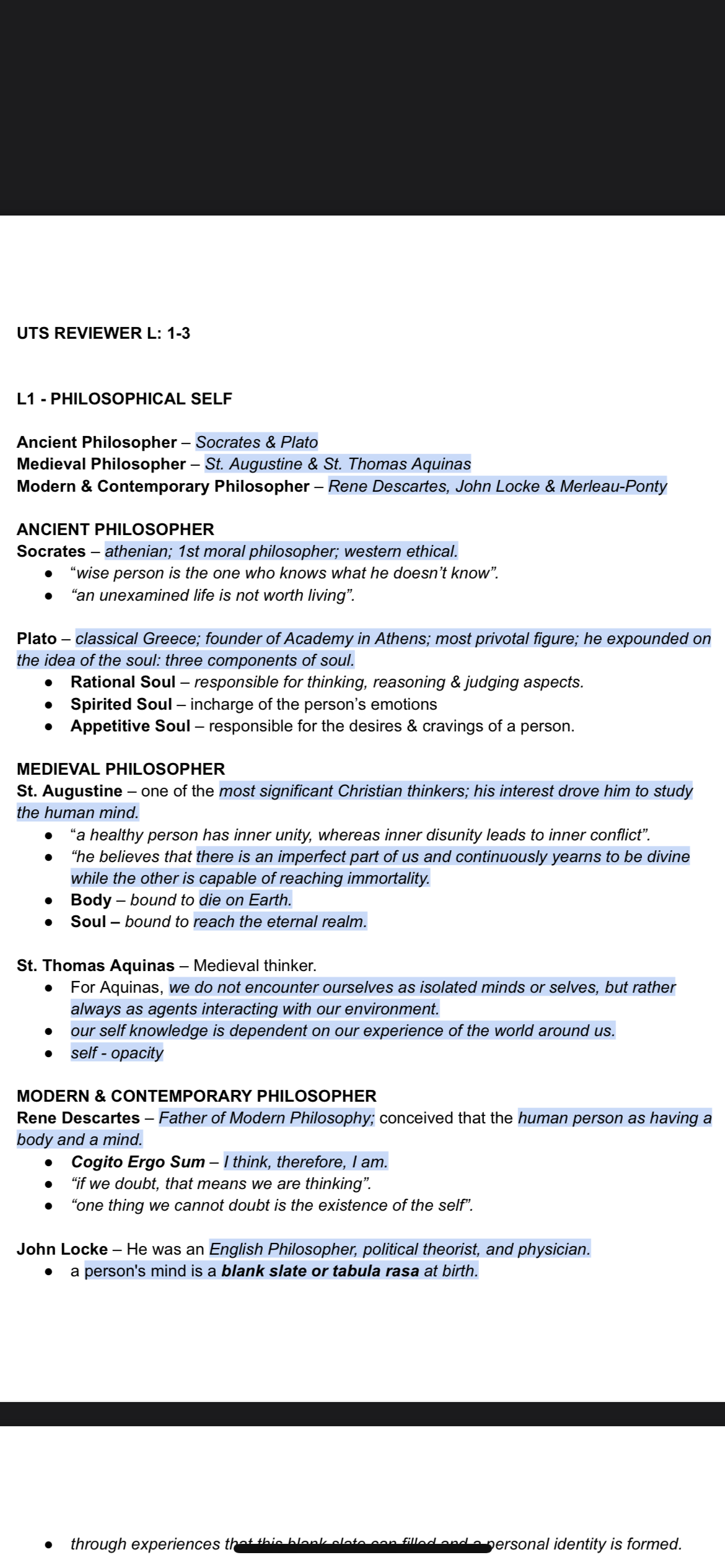What are the views of different philosophers on the concept of the self?

Understand the Problem
The document provides a summary of key philosophers and their views on the concept of the self throughout different historical periods, highlighting their notable quotes and theories.
Answer
Different philosophers have varied views on the self: Socrates (wisdom), Plato (three-part soul), Augustine (dual nature), Aquinas (interaction with environment), Descartes (mind-body dualism), and Locke (tabula rasa).
Here are the views of different philosophers on the concept of the self:
-
Socrates: He believed that a wise person is the one who knows what they don’t know, and that an unexamined life is not worth living.
-
Plato: He proposed that the self consists of three components of the soul: the Rational Soul (responsible for thinking and reasoning), the Spirited Soul (in charge of emotions), and the Appetitive Soul (responsible for desires and cravings).
-
St. Augustine: Augustine thought that the human mind has an imperfect part that yearns to be divine and immortal. He divided the self into the Body (bound to die on Earth) and the Soul (bound to reach the eternal realm).
-
St. Thomas Aquinas: Aquinas believed that we do not encounter ourselves as isolated minds but as agents interacting with our environment. Our self-knowledge relies on our experiences of the world around us.
-
Rene Descartes: Known as the Father of Modern Philosophy, Descartes conceived of the human person as having a body and a mind. He famously stated, "Cogito Ergo Sum" - "I think, therefore, I am," asserting the existence of self through the act of thinking.
-
John Locke: Locke viewed the mind at birth as a blank slate or tabula rasa, upon which experiences write, thereby forming personal identity.
Answer for screen readers
Here are the views of different philosophers on the concept of the self:
-
Socrates: He believed that a wise person is the one who knows what they don’t know, and that an unexamined life is not worth living.
-
Plato: He proposed that the self consists of three components of the soul: the Rational Soul (responsible for thinking and reasoning), the Spirited Soul (in charge of emotions), and the Appetitive Soul (responsible for desires and cravings).
-
St. Augustine: Augustine thought that the human mind has an imperfect part that yearns to be divine and immortal. He divided the self into the Body (bound to die on Earth) and the Soul (bound to reach the eternal realm).
-
St. Thomas Aquinas: Aquinas believed that we do not encounter ourselves as isolated minds but as agents interacting with our environment. Our self-knowledge relies on our experiences of the world around us.
-
Rene Descartes: Known as the Father of Modern Philosophy, Descartes conceived of the human person as having a body and a mind. He famously stated, "Cogito Ergo Sum" - "I think, therefore, I am," asserting the existence of self through the act of thinking.
-
John Locke: Locke viewed the mind at birth as a blank slate or tabula rasa, upon which experiences write, thereby forming personal identity.
More Information
Philosophers have pondered the concept of the self for centuries, contributing unique perspectives that range from the mind-body dualism of Descartes to the idea of the blank slate by John Locke.
Tips
A common mistake is assuming that all philosophers view the self similarly, while in reality, their perspectives vary greatly.
Sources
- Knowledge of the Self - Stanford Encyclopedia of Philosophy - plato.stanford.edu
- Philosophy of self - Wikipedia - en.wikipedia.org
- 12 Philosophers | PDF | Philosophy Of Self | Soul - Scribd - scribd.com